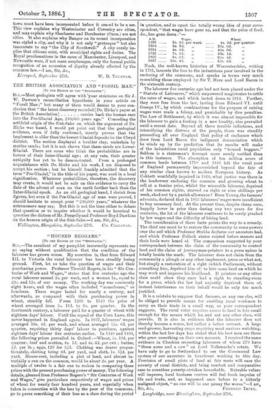THE BRITISH ASSOCIATION AND "FOSSIL MAN." [To THE EDITOR OP
THE " SPECTATOR."]
Sia,-Most geologists will agree with your strictures on Sir J. W. Dawson's reconciliation hypothesis in your article on ." Fossil Man ;" but many of them would demur to yonr con- clusion that " the latest discovery recorded [Dr. Hicks's paper at
the British Association] carries back the human race into the Pre-Glacial Age, 240,000 years ago." Conceding the artificial origin of the flint-flake on which the argument of Dr. Hicks was based, I would yet point out that the geological -evidence, even if fully confirmed, merely proves that the implement is older than the lowest Glacial deposits in the Clwyd district. The section displayed a boulder clay, underlain by marine sands; but it is not shown that these sands are Lower- Glacial. There are some who think the probabilities are in favour of their Inter-Glacial age ; at any rate, their greater antiquity has yet to be demonstrated. From a prolonged acquaintance with Dr. Hicks and his work, I am disposed to accept his section ; but he himself frankly admitted that the term "Pre-Glacial," in the title of his paper, was used in a local signification. Whatever probabilities, therefore, the discovery may create, it would not be safe on this evidence to carry the -date of the advent of man on the earth further back than the Inter-Glacial epoch. As an old geological hand, I shrink from figures, but even if the Pre-Glacial age of man were proved, I should hesitate to accept your " 240,000 years," whatever the astronomers may say. But this is not the time either to debate that question or to inquire whether it would be heretical to question the dictum of Mr. Pengelly and Professor Boyd Dawkins on the human origin of the flint-flake.-I am, Sir, &c., Wellington, Shropshire, September 27th. CII. CALL WAY.


































 Previous page
Previous page